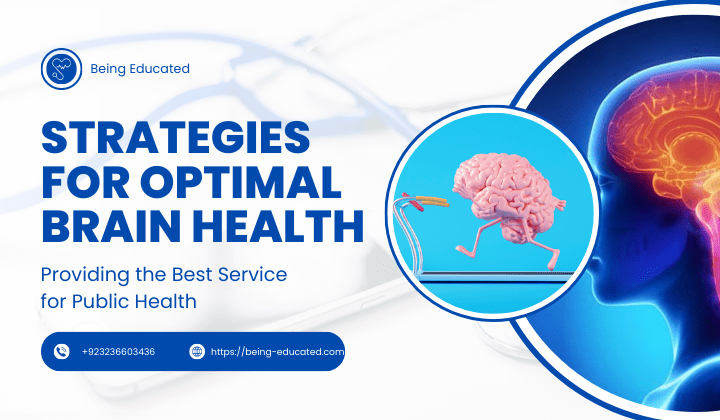Cognitive function refers to the mental processes involved in acquiring knowledge, understanding, reasoning, and decision-making. As we age or face various challenges, it is natural for cognitive abilities to undergo changes. However, there are proactive steps individuals can take to enhance and maintain their cognitive function throughout their lives. In this article, we will explore strategies and lifestyle changes that can help improve cognitive function and promote optimal brain health.
1. Engage in Regular Exercise
Physical exercise has numerous benefits for overall health, including cognitive function. Regular exercise increases blood flow to the brain, promotes the growth of new neurons, and enhances synaptic plasticity. Studies have shown that aerobic exercise, such as brisk walking, running, or cycling, can improve memory, attention, and information processing speed. Engaging in activities that challenge both the body and mind, such as dancing, yoga, or martial arts, can have additional cognitive benefits.
2. Stimulate Your Brain with Mental Challenges
Just as physical exercise strengthens the body, mental exercise is vital for maintaining cognitive function. Engaging in mentally stimulating activities can help sharpen the mind and enhance cognitive abilities. Activities such as reading, puzzles, crosswords, Sudoku, playing chess or other strategy games, learning a musical instrument, or taking up a new hobby can all provide the necessary mental stimulation to improve cognitive function. It is important to continually challenge the brain with new and varied tasks to promote cognitive growth.
3. Prioritize Quality Sleep
Sleep plays a crucial role in cognitive function and overall brain health. During sleep, the brain consolidates memories and processes information, supporting learning and problem-solving abilities. Lack of sleep can impair attention, concentration, and memory, negatively impacting cognitive performance. To improve cognitive function, it is important to prioritize quality sleep by maintaining a regular sleep schedule, creating a comfortable sleep environment, and practicing good sleep hygiene habits.
4. Adopt a Brain-Healthy Diet
Proper nutrition is essential for optimal brain health and cognitive function. Certain nutrients, such as omega-3 fatty acids, antioxidants, vitamins, and minerals, have been linked to improved cognitive abilities and a reduced risk of cognitive decline. A brain-healthy diet includes a variety of fruits, vegetables, whole grains, lean proteins, and healthy fats. Foods rich in omega-3 fatty acids, such as fatty fish, walnuts, and flaxseeds, can provide additional cognitive benefits. It is important to limit the consumption of processed foods, sugary snacks, and unhealthy fats, as they can have a negative impact on brain health.
5. Manage Stress Levels
Chronic stress can have detrimental effects on cognitive function. Prolonged exposure to stress hormones can impair memory, attention, and decision-making abilities. Therefore, it is important to develop effective stress management techniques. Practices such as meditation, deep breathing exercises, mindfulness, and engaging in activities that promote relaxation, such as yoga or tai chi, can help reduce stress levels and improve cognitive function.
6. Maintain Social Connections
Social interaction is not only crucial for emotional well-being but also for cognitive function. Engaging in meaningful social connections and participating in social activities can provide cognitive stimulation and help maintain mental sharpness. Regular social interaction can enhance memory, attention, and problem-solving abilities. Joining clubs, volunteering, attending social events, or participating in group activities can all contribute to improved cognitive function.
7. Continual Learning and Intellectual Curiosity
The brain thrives on novelty and intellectual curiosity. Engaging in lifelong learning and pursuing new interests can help improve cognitive function. Taking courses, attending workshops or seminars, reading educational material, or exploring new subjects of interest can provide cognitive stimulation and promote neural connections in the brain. The process of continual learning keeps the mind active, flexible, and receptive
to new information, contributing to improved cognitive abilities.
8. Maintain a Healthy Lifestyle
A healthy lifestyle can significantly impact cognitive function. Avoiding smoking and excessive alcohol consumption is crucial, as both can have detrimental effects on brain health and cognitive abilities. It is also important to manage chronic health conditions such as hypertension, diabetes, and obesity, as these conditions can negatively affect cognitive function. Engaging in regular health check-ups, following medical advice, and maintaining overall physical well-being can support cognitive health.
Conclusion
Improving cognitive function is a lifelong endeavor that requires a holistic approach. Engaging in regular exercise, stimulating the brain with mental challenges, prioritizing quality sleep, adopting a brain-healthy diet, managing stress, maintaining social connections, fostering intellectual curiosity, and maintaining a healthy lifestyle are all strategies that can promote optimal brain health. By incorporating these practices into daily life, individuals can enhance their cognitive abilities, maintain mental sharpness, and support overall brain health for years to come. Dale Hewett is the owner and founder of New Phase Blends, a company that specializes in focus and cognitive products.
Read Also:
Car accident attorney Los Angeles CZ.LAW
Planet Fitness Body Enhancement- Complete Guide
how many pushups should i do a day










